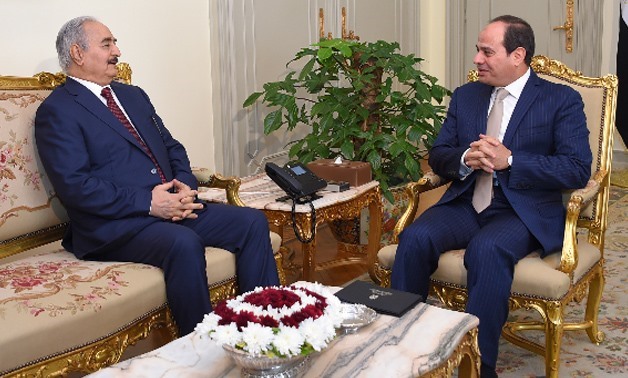
President Abdel Fattah al-Sisi - (Archive)
CAIRO – 14 May 2017: In the light of President Abdel Fattah al-Sisi's meeting with Libyan General Khalifa Haftar Saturday in Cairo, it seems that Egypt is continuing its long-standing role as troubleshooter in the region as it attempts to reach a reconciliation agreement for its neighboring country. Yet, there is still much effort needed in the Libyan case.
With two governments divided in two different main cities of Libya, a reconciliation, accord, and consensus is needed between both entities. Egypt, UAE, Algeria and Tunisia are among the key Libyan neighbors taking part in this process.
Egypt and Libya have always enjoyed special relations due to geographical, political, economic and strategic commonalities. Yet, Libya has become a concern for Egypt ever since 2011.
Egypt emphasizes today the necessity of reaching a peaceful solution based on the Al-Sokhayrat agreement, which is considered the political reference and basis for any possible reconciliation to take place in the Libyan region.
Egypt was one of the first who urged the other neighboring countries of Libya to take part in a possible negotiation process for Libya, and this has been achieved by continuous meetings with countries like Algeria.
In the same context, General Haftar expressed appreciation for the important role of Egypt in the Libyan crisis, praising its efforts at helping the various parties to reach a consensus as well as its keenness to ensure the stability of the situation in Libya under the fraternal ties that bring together the Egyptian and Libyan people. This is not a newly adopted attitude of Egypt towards Libya though; Egypt has always had special close-knit relations with Libya within the ideological framework of Arab nationalism.
Late president of Libya, Gaddafi, made an appeal for unity with the Egyptian state by the signing of the Charter of Tripoli in December 1969, which included the so-called Arab Nationalist Front, and, at a later stage, establishing the Federation of Arab Republics between Egypt, Libya and Syria on April 17, 1971. With Libya and Syria facing manifold crises today, Egypt is seeking the restoration of stability and unity.
Egypt was considered Libya’s ally facing the outside world after the Lockerbie crisis and the American blockade, which resulted in an international siege on Libya, based on a UN resolution in 1992. Based on this history of solidarity, Egypt has refused to take part in the coalition against Libya after a UN resolution in 2011, even though some other Arab countries urged it to do so. Egypt also had a vested interest in the welfare of numerous Egyptians on Libyan soil and enacted measures specifically designed for their safety.
Ever since the Arab summit conference in Morocco in 1989, Egypt and Libya have been collaborating on new joint efforts of security and deterrence.
Since 2011, Egypt has focused on fashioning a more effective deterrence strategy concerning its western borders with Libya; the aim was to face the dangers and security breaches of that side in a more vigorous hands-on manner.
Egyptian-Libyan relations have been usually based on logistic support and a common strategy of defense. The western borders of Egypt that are shared with Libya have long constituted a pivotal factor in Egypt’s international strategy of defense since 2011, as well as playing a key role in Egypt's local security measures after the 2011 revolution.
Egypt’s strategy in securing the western borders is executed through logistic support with its Libyan neighbor. This resulted in the Egyptian Proactive Initiative. The initiative also aims at economic and commercial collaboration between the two countries, and is not solely restricted to political issues.
Egypt believes in the unity and solidarity of Arab countries as they face various forms of economic, political and religious challenges today; a conviction which spurs the policymakers of Egypt to lean towards the elimination of terrorists groups who undermine the chances for reconciliation and aggravate existing conflicts at every step of the way.

Comments
Leave a Comment